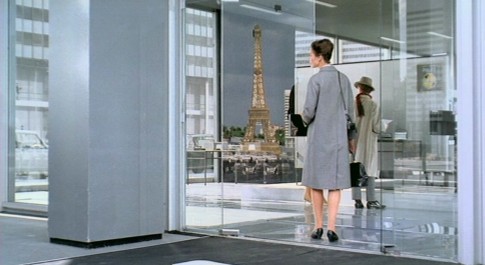I can very happily report that since I first published this article, in the February 6, 2004 Chicago Reader, a few Barnet films have become available on DVD, including the two I wrote about, and a few more are reportedly on the way from Ruscico, a Russian label that has been issuing subtitled DVDs that I wrote about here. Earlier, Image Entertainment brought out Outskirts and The Girl with the Hatbox on a single DVD, and in France, www.bachfilms.com released both By the Bluest of Seas (under its French title, Au bord de la mer bleue), which Ruscico has subsequently released as well, and the 1943 A Good Lad/Men of Novgorod (again, under its French title, Un brave garçon). More recently, I showed clips from Okraina as well as other early Russian talkies (Deserter and Enthusiasm) in a course, “The First Transition: World Cinema in the 30s”, Kevin Lee has made a wonderful video about By the Bluest of Seas with a rapturous critical commentary written by Nicole Brenez, and in the summer of 2011, Il Cinema Ritrovato in Bologna presented a comprehensive Barnet retrospective, most of which I was able to attend.
Recently reseeing By the Bluest of Seas at the Arsenal in Berlin, as part of a program devoted to Frieda Grafe’s favorite films, I was more blown away than ever, and it struck me that the film could be viewed in some ways as an erotic view of collectivism and socialism, with the sea serving as a perfect emotional metaphor — and a perfect sort of reply to what Luc Moullet maintained in his review of Jet Pilot, which implied that eroticism, as in that film and The Fountainhead, was always tied in some fashion to right-wing thinking. Read more
This essay started out as a lecture given on the final day of “Urban Trauma and the Metropolitan Imagination,” a conference organized by Scott Bukatman and Pavle Levi and held at Stanford University on May 5-7, 2005. Then it was reprinted in World Cinemas, Transnational Perspectives, edited by Nataša Ďurovičová and Kathleen Newman, New York/London: Routledge, 2009, and it’s appeared in my collection Goodbye Cinema, Hello Cinephilia: Film Culture in Transition (University of Chicago Press, 2010). — J.R.


My subject is the presence or absence of both shared public space and virtual private space in two visionary and globally-minded urban epics made about 37 years apart, on opposite sides of the planet — Jacques Tati’s Playtime (1967) and Jia Zhangke’s The World [Shijie] (2004), coincidentally the fourth commercial feature of each writer-director. Both films can be described as innovative and very modern attacks on modernity, and both have powerful metaphysical dimensions that limit their scope somewhat as narrative fictions. I should add that they both project powerful yet deceptive visions of internationalism that are predicated both literally and figuratively on trompes d’oeil, specifically on tricks with perspective and the uses of miniaturized simulacra. (I’m referring here to both emblematic sites, such as the Eiffel Tower in both films, and the scaled-down skyscrapers used in the set built for Playtime.) Read more
From the Chicago Reader (June 9, 2000). — J.R.

The Edge of the World
Rating *** A must see
Directed and written by Michael Powell
With John Laurie, Belle Chrystall, Eric Berry, Finlay Currie, Niall MacGinnis, Grant Sutherland, Campbell Robson, and Powell.

In a recent review in the Times Literary Supplement, American sociologist and historian Richard Sennett examined the failure of socialism in the United States and argued that Americans seem to have a different take than people in England and continental Europe on collectivity itself. One reason he suggests for this difference — that slavery confused and perhaps even undermined our overall sense of the dignity of labor, ultimately altering our sense of collective labor — is both provocative and debatable. But whether or not one buys into his theory, it’s hard to deny that Americans practice and relate to groupthink somewhat differently than Europeans. “The herd of independent minds” was the late Harold Rosenberg’s memorable phrase describing us in all our paradoxical singularity.
I happened to read Sennett’s words a few hours after seeing the restoration of Michael Powell’s beautifully archaic and mystical 1937 epic about communal life on Foula — the Shetland island farthest from the coast of Scotland — which is playing this week at the Music Box. Read more




